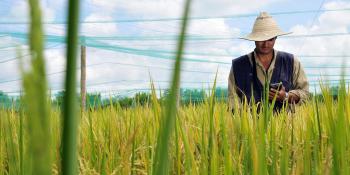Regional workshop: promoting cross-scale science-informed policy making for accelerated development of climate-smart agriculture and nationally determined contributions in West Africa
Pursuant to the Paris Agreement, countries within West Africa have identified the potential for the agricultural sectors to deliver adaptation-mitigation synergies, as well as economic, environmental and social co-benefits. In addition, CSA is explicitly referred to in the Nationally Determined Contributions (NDCs) in the context of seizing adaptation-mitigation synergies, which indicates a growing momentum for climate action in the agricultural sector, as well as the opportunities for synergies and the corresponding need for international support.
On a different but complementary note, ECOWAS recently indicated its intentions to improve the shortcomings of the National Agricultural Investment Plans (NAIPs) and Regional Agricultural Investment Plans (RAIPS) in the quest to achieve sustainable food security in the face of climate change challenges by:
- Integrating CSA in the NAIPs of the 15 ECOWAS countries and in the RAIP at regional level;
- Assisting the countries in increasing climate funding mobilization for CSA within the framework of their NAIPs and develop a CSA monitoring-evaluation framework in the context of ECOWAP/CAADP monitoring-evaluation system; and
- Strengthening inter-institutional dialogue and cross-sector cohesion around CSA between agricultural policies and programs for climate adaptation and water management both at national level and regional level.
For CCAFS to contribute in this direction, there is a need to generate ground-breaking scientific evidence on how different practices, technologies, services, processes, and institutional arrangements contribute to the distinct pillars of CSA, and the synergies and trade-offs between these pillars across a range of agro-ecologies and social contexts. Evidence is needed on which options generate CSA-related outcomes, where the options should be targeted, the costs involved, and their expected co-benefits or disbenefits (including gender and labour aspects). For effective science-policy interactions, countries have to be supported in using evidence generated to put in place policy, institutional, technical and financial means to mainstream climate change considerations into agricultural sectors and provide a basis for operationalizing sustainable agricultural and food systems under changing climatic conditions.
Since 2012, CCAFS has been addressing the need for proven and effective CSA using the Climate-Smart Village (CSV) approach as a means for agricultural research for development (AR4D) in the context of climate change. The CSV approach was founded on the principles of participatory action research for grounding research on appropriate and location/context-specific enabling conditions, generating greater evidence of CSA effectiveness in a real-life setting and facilitating co-development of scaling mechanisms towards landscapes, subnational and national levels.
On the policy front, CCAFS has used scenarios testing and review exercises to improve the robustness of agricultural policies and development plans to climate uncertainties and supported institutional settings at the village, district and national levels such as the national science policy dialogue platforms to spearhead the advocacy for climate-smart agriculture (CSA) mainstreaming into agricultural development plans, policies, programs and strategies in West Africa.
p.p1 {margin: 0.0px 0.0px 0.0px 0.0px; font: 11.0px 'Arial Narrow'} p.p2 {margin: 0.0px 0.0px 0.0px 0.0px; font: 16.0px 'Arial Narrow'}
From 2019 to 2022, CCAFS wants to build on its achievements in West Africa (specifically Burkina Faso, Ghana, Mali, Niger and Senegal) to meet major development needs and strategically contribute to emerging policy initiatives such as the NAIPS and NDC implementation in the region while also using socio-economic scenarios to understand complex interactions between socio-economic factors, political developments and climate change in order to generate policy recommendations that can be integrated into national agricultural development plans, strategies and programs. In addition, climate science, policy and environmental research, and agricultural modeling will be linked with food systems research (in CSVs) and socio-economic scenarios to integrate climate concerns into food security and nutrition planning.
Given the important role of our partners in the impending work of CCAFS, we have found it necessary to engage with everyone to discuss and appraise the operations, achievements, and shortcomings of our collaborative projects to inform the definition of critical planning and research decisions for 2019 and onwards. This will also be an opportunity for country stakeholders to learn from CCAFS AR4D achievements at the community level across West Africa, and how these outputs could feed the bottom up science-policy informed decision-making mechanism.
Workshop objectives
The objectives of this annual planning workshop are:
- To reflect and appraise successes and lessons learnt from Climate-Smart Villages as well as from the operation of the national science policy dialogue platforms;
- To share and discuss the vision of the platform and expectations from country partners in achieving country-and regional-level outcomes on policies related to climate change, agriculture and food security;
- To deliberate on different policy engagement strategies for effective science-policy interaction; and
- To discuss planned projects for 2019 onwards.
Expected results
- Appraised achievements and shortfalls in the coordination and implementation of platform activities;
- Vision, expectations and thematic areas of interest defined for the science policy dialogue platforms;
- Planned projects discussed and annotated outlines of proposals developed; and
- Feedback provided for individual platforms for effective teamwork and implementation of planned activities.
p.p1 {margin: 0.0px 0.0px 0.0px 0.0px; font: 11.0px 'Arial Narrow'} p.p2 {margin: 0.0px 0.0px 6.7px 0.0px; font: 11.0px 'Arial Narrow'}
p.p1 {margin: 0.0px 0.0px 0.0px 0.0px; font: 12.0px Symbol; min-height: 12.0px}
p.p2 {margin: 0.0px 0.0px 1.5px 0.0px; font: 11.0px 'Arial Narrow'}
p.p3 {margin: 0.0px 0.0px 0.0px 0.0px; font: 11.0px 'Arial Narrow'}
span.s1 {font: 11.0px Symbol}


